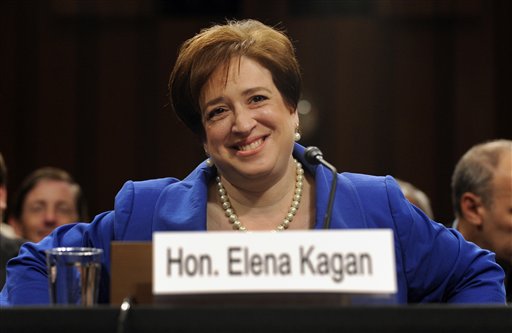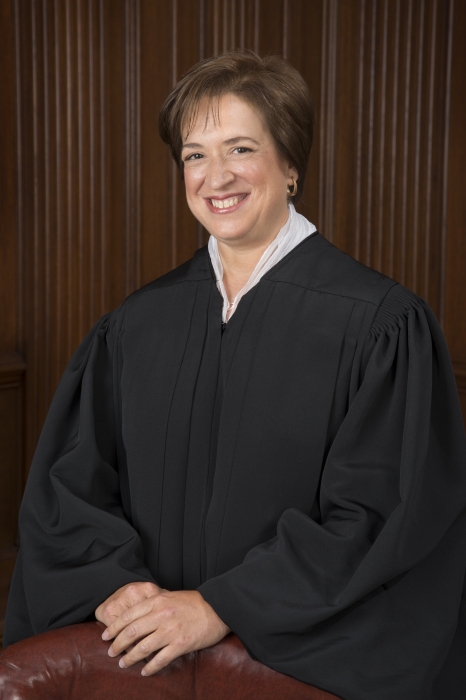Elena Kagan (1960- ) is an associate justice of the U.S. Supreme Court known for her deep knowledge of First Amendment issues, not only as a jurist but also as a former member of the legal academy.
Kagan is known as a legal academic
Born in New York City, Kagan earned her undergraduate degree from Princeton University, where she graduated summa cum laude. She then obtained a Masters in Philosophy from Worchester College in Oxford. She graduated from Harvard Law School, where she served on the Harvard Law Review.
Kagan clerked for Judge Abner J. Mikva of the U.S. Court of Appeals for the District of Columbia and then for U.S. Supreme Court Justice Thurgood Marshall. She then practiced at the Washington, D.C., law firm of Williams & Connelly before joining the faculty at the University of Chicago Law School.
As an academic, Kagan often wrote about First Amendment free-speech issues. For example, she wrote
- A 1992 article in The Supreme Court Review, “The Changing Faces of First Amendment Neutrality: R.A.V. v. St. Paul, Rust v. Sullivan, and the Problem of Content-Based Underinclusion”
- A 1993 piece in the University of Chicago Law Review, “Regulation of Hate Speech and Pornography After R.A.V.”
- A 1996 article in the U.C. Davis Law Review, “When a Speech Code is a Speech Code: The Stanford Policy and the Theory of Incidental Restraints”
- A 1996 article in the University of Chicago Law Review, “Private Speech, Public Purpose: The Role of Governmental Motive in First Amendment Doctrine”
Her scholarship shows a deep understanding of First Amendment principles and doctrines.
Kagan was appointed to the Supreme Court by Obama
She served as associate White House counsel for President Bill Clinton in 1995-96 before returning to academia. In 2003, she was named dean of Harvard Law School, where she served before returning to government service.
In 2009, President Barack Obama appointed her as solicitor general of the United States, in which capacity she argued numerous cases before the U.S. Supreme Court, including the landmark campaign finance decision Citizens United v. Federal Elections Commission (2010). Then, in 2010, President Obama appointed her to the U.S. Supreme Court. The Senate confirmed her by a vote of 63 to 37.

As an associate justice on the Supreme Court, Elena Kagan has used her extensive to First Amendment knowledge to write many concurring and dissenting opinions in cases such as Arizona Free Enterprise Club’s Freedom Club v. Bennett (2011) and Reed v. Town of Gilbert (2015). In this photo, Kagan smiles at the conclusion of her first day of confirmation hearings in 2010. (AP Photo/Susan Walsh)
Kagan has written many First Amendment opinions and dissents
To date on the high court, Kagan’s most significant First Amendment opinions have been written either in concurrence or dissent. For example, she wrote a dissenting opinion in the establishment-clause decision Town of Greece v. Galloway (2014). She believed that the town’s practice of having mainly Christian prayers before town meeting violated a “norm of religious equality” and “engaged in a course of religious favoritism anathema to the First Amendment.”
She has dissented in many of the Court’s 5–4 campaign-finance cases.
In Arizona Free Enterprise Club’s Freedom Club v. Bennett (2011), she wrote the dissenting opinion in a case where the majority had invalidated parts of Arizona’s Clean Elections Act that limited the spending of wealthy candidates to that of publicly funded candidates. “The First Amendment’s core purpose is to foster a healthy, vibrant political system full of robust discussion and debate,” she wrote. “Nothing in Arizona’s anti-corruption statute, the Arizona Citizens Clean Elections Act, violates this constitutional protection.”
In Reed v. Town of Gilbert (2015), Kagan authored a concurring opinion that agreed that an Arizona town’s sign ordinance was unconstitutional but questioned whether the Court had overstated the content-discrimination principle.
“We can administer our content-regulation doctrine with a dose of common sense, so as to leave standing laws that in no way implicate its intended function,” she wrote.

